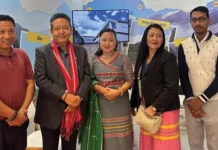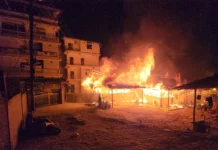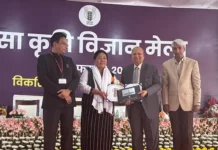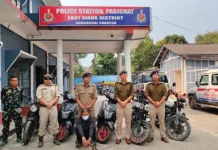ZIRO, 15 Mar: A comprehensive research study to find out the causes of rising stomach cancer in Arunachal Pradesh as a whole and Ziro valley in particular will be jointly undertaken by the State Cancer Society of Arunachal Pradesh (SCSAP), in collaboration with Dr B Borooah Cancer Institute (BBCI), Guwahati, NIPER Guwahati, IIT Guwahati, RGU, and the Tertiary Cancer Centre of (TCC) TRIHMS.
This was the outcome of a meeting held on Friday in the official chamber of Lower Subansiri Deputy Commissioner Vivek HP and other stakeholders.
The meeting was attended by Prof Dr Ashok Kr Das from the BBCI, Prof Dr Abhijit Talukdar from BBCI, RGU Anthropoly HoD Dr M Asghar, and TCC TRIHMS radiation oncologists Drs Hage Sonia and Rubu Sunku.
The meeting was a follow-up of the cancer screening and awareness camp held from 6 to 8 October last year here by the SCSAP.
Dr Ashok Kr Das informed that the incidence of gastric cancer is very high in Arunachal, particularly in the Ziro plateau.
“The cause of this high incidence is unknown, but it is presumed that multiple factors, notably dietary factors, prevalence of pathogens in the stomach, tobacco use, presence of heavy metals in food and water, besides genetic causes are responsible for the high incidence of the disease,” Dr Das said.
He said added: “In order to formulate effective intervention strategies, it is imperative to understand the prevalence of these risk factors, the cumulative exposure of individuals, and the community to these risk factors, and the stage by stage change caused by these risk factors which ultimately lead to malignant transformation of the gastric mucosa.
“With this knowledge, it will be possible to formulate appropriate intervention strategies to mitigate this risk.” he informed.
Explaining the modus operandi of the upcoming research work, Dr Das informed that the research proposal aims to integrate community participation in implementing the programme at every step.
Dr Das further explained that the methodology adopted will be a cross-sectional study of the population, followed by a longitudinal study to identify the effect of interventions, and also to monitor people under high risk.
“In the first phase, participants will be screened using endoscopy and mucosal biopsy for histopathology and microbial study (BBCI and TCC TRIHMS).
“Approximately 100 such screening camps will be conducted over 36 months of the project, covering 6,000 to 10,000 people. In parallel, food habits will be recorded to assess food frequency exposure (by RGU).
“Different food items and water will be sampled and analysed at NIPER Guwahati for carcinogens.
“After collating data and statistical analysis to derive cause consequence relationships, probable intervention strategies will be devised and shared with the community for adoption (all institutes and state administration).
“During the second phase, the quality and extent of adoption will be monitored, and individuals at high risk (approximate number anticipated to be 200-300) will be followed up clinically with periodic yearly endoscopy’ (State Cancer Society and TRIHMS).
“If found to be successful, these interventions will result in gradual decrease in gastric cancers, which will be fully evident and stable in 20 years.
“It is also expected that many of the same factors are responsible for the high gastric cancer incidences in the rest of Arunachal, and the same interventions will be effective in bringing down this number.
“The tentative cost of the research work is Rs 450 lakhs, spread over 36 months, which includes two video-endoscopy units for Gyati Takka General Hospital, Ziro. The proposal under preparation will be submitted to the ICMR for consideration,” informed Dr Das. (DIPRO)




